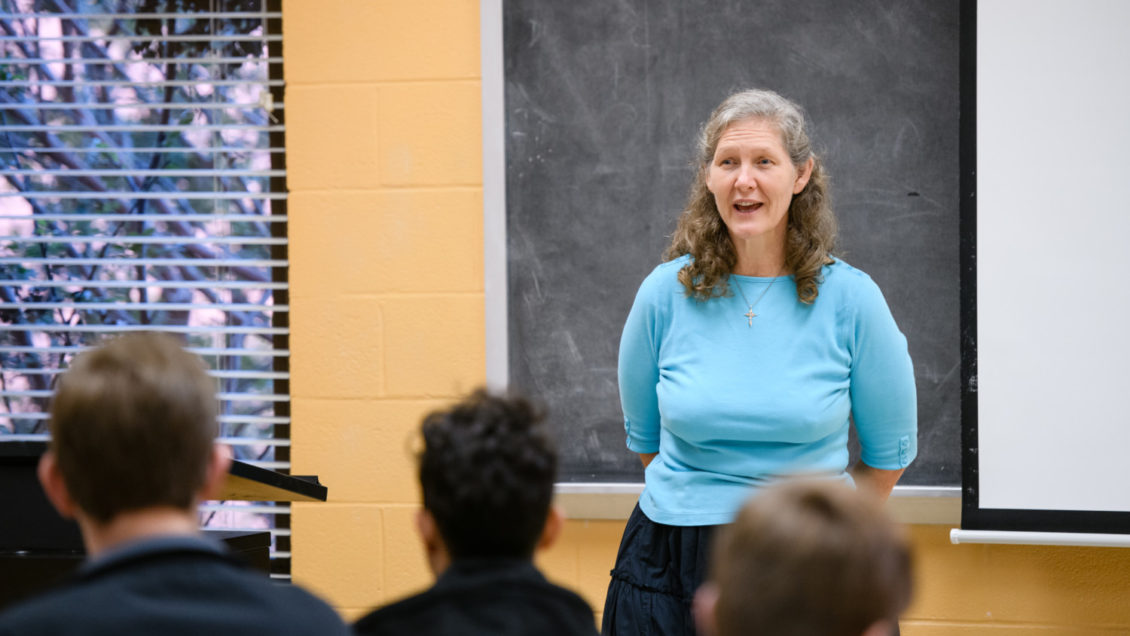For two weeks in September, Charissa Fryberger taught English in a remote city in East Kazakhstan that still bears oppressive reminders of the Soviet Union: drab bloc housing, rickety trams and mining operations that choke the air.

Still Fryberger, a Clemson graduate student and English composition instructor, cherished the experience.
“It’s a great gift to be able to go there and teach those kids,” Fryberger said.
“It’s really fun to see the Kazakh students get a sparkle in their eye when they talk about what they can do with their education. English is the ticket for them out of the mines.”
She also admired the hospitable and vibrant Kazakh culture, and the strength of the people she met.
It was the second time that Fryberger had taught classes at Kazakh-American Free University in Ust-Kamenogorsk.
Now, Fryberger is excited about the possibility of teaching abroad on a more permanent basis after she earns her master’s degree in English this spring.
Ust-Kamenogorsk is a hardscrabble place with a life expectancy of 60 for men, though higher for women, Fryberger said.
When she first stepped into classrooms there, Fryberger noticed something curious: most of the students were women. One classroom had no male students at all.
“I asked, ‘Where are the men?,'” she said. “Most of the men wind up working in the mines. They don’t have the opportunity to go to college.”
Broadening opportunities
Mining has long been the backbone of the Ust-Kamenogorsk economy.

Higher education greatly expands the possibilities for the local students, she said.
“Most of the kids have come to the university from the villages, and it’s a huge opportunity for them to go to school, especially the men,” Fryberger said. “They’re aware of that.”
At the university, Fryberger taught 47 sessions in nine days: English language classes to lower-level students and American literature and culture classes to upper-level students.
She said the students who can become English teachers or translators have more job possibilities, particularly in Kazakhstan’s large metropolitan areas of Almaty and Astana.
Fryberger found that Kazakh students are particularly curious about the United States, so she took one class on a virtual tour of the nation.
“I talked about New York and walking through Central Park and across the Brooklyn Bridge and (visiting) the Statue of Liberty,” Fryberger said. “I got out a map, and said, ‘So where else do you want to go?’ We went to the Grand Canyon and Hollywood and Yellowstone National Park – all the places they had heard about – and I described what we’d see there and do there. It was really fun.”
Fryberger also connected Clemson students with some Kazakh students in an email version of pen pals.
She found that students are mostly the same worldwide.
“It’s really fun to stand in front of them and realize how much the cultural and socioeconomic differences really don’t matter,” Fryberger said.
Teaching abroad
Teaching has long been a passion for Fryberger. She homeschooled her four children, who are now grown. She coached debate at the University of Wyoming. In 2015, Fryberger spent two weeks teaching classes at an orphanage in Haiti.
Fryberger traveled to Kazakhstan mostly at her own expense, but with the assistance of a small grant from the Russian minor program within the Clemson University Department of History.
Though she paid for her own transportation to Kazakhstan, her lodgings and meals were often provided.
“Kazakhs are very hospitable people. They have a hotel that belongs to the college and they feed us very well,” Fryberger said.
“The vodka flows,” she added with a laugh.
Fryberger said she has been in love with Eastern Europe and Russia since she first saw gymnast Olga Korbut charm the world at the 1972 summer Olympics. She was a young gymnast at the time. “Russia has been on my heart since I was 10 years old,” she said.
Fryberger earned her undergraduate degree at Colorado College in political science with a concentration in Eastern European and Soviet studies. She also studied the Russian language.
Fryberger arrived at Clemson in the fall of 2017 to begin her master’s program in English.
She hadn’t expected to be diagnosed with breast cancer shortly after she began classes at Clemson, but the ongoing medical treatment has not slowed her down.
Fryberger lives in Clemson with her husband, David, and often walks to and from campus – two miles each way.
She currently takes a class in the Russian language while teaching two first-year level composition courses at Clemson and also serving on the staff of the South Carolina Review.
When the opportunity came to teach in Kazakhstan, Fryberger didn’t hesitate.
She had connected with an Oregon-based nonprofit, Co-Serve, which places volunteer instructors with universities abroad for two-week sessions.
Her team included Americans who lectured in business and health care, among other disciplines.
Fryberger’s experiences abroad inspired her to lay the groundwork for teaching internationally in the future.
In June, Fryberger traveled to Prague for an intensive five-week course leading to her certification in TEFL – Teaching English as a Foreign Language.
The Clemson Humanities Hub provided $1,000 toward Fryberger’s TEFL certification and the English Department also contributed $500.
With TEFL certification, Fryberger now has the credentials to teach English in 80 countries.
What does she like most about teaching?
“I really enjoy taking students at the beginning who don’t think they like to write, and saying, ‘We can make this easier,’ and then we work through the semester so that writing becomes natural,” she said.
Get in touch and we will connect you with the author or another expert.
Or email us at news@clemson.edu

